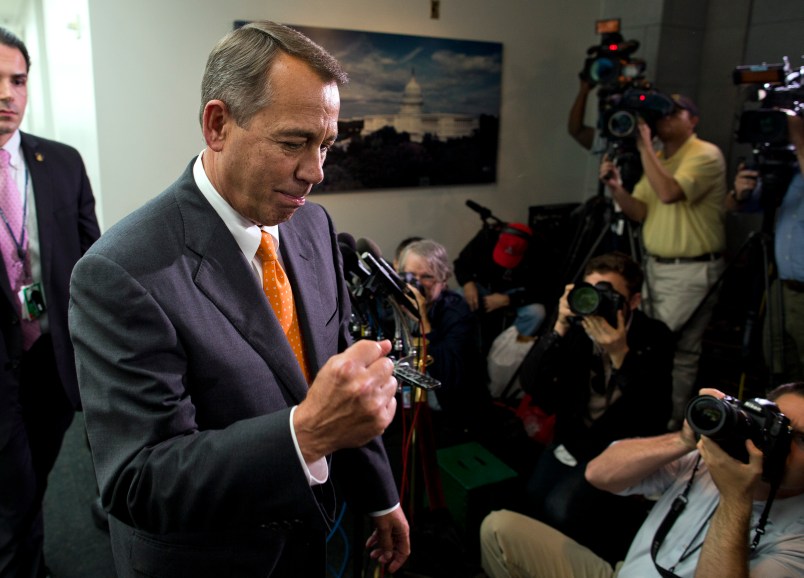House Republicans hate the Senate deal to avert economic disaster and re-open the government. But they don’t blame Speaker John Boehner for feeding them a bitter pill in the end. Far from it. They gave him a standing ovation for fighting the good fight, and vowed that his speakership would be secure.
“I think the Speaker has done an admirable job,” said Rep. Jim Jordan (R-OH), a staunch conservative and an engineer of the shutdown and debt default confrontation. “For a couple weeks here, you’ve seen us very unified.”
And what about all the talk that he may be overthrown for breaking the “Hastert Rule” and bringing up a bill without the support of the Republican conference? “There’s not a single member talking about that,” Jordan told TPM on Wednesday afternoon.
“I think he’s done as good as he could do,” said Rep. Walter Jones (R-NC). “You have to look at the political odds of it, and the odds were never in favor of the House.”
Boehner’s strategy through the confrontation reflects his handling of the “fiscal cliff” late in 2012: cater to his conservative flank until the bitter end, let them call the shots and prove he’s willing to fight for their interests. If Democrats hold firm by the time the country is on the brink, bite the bullet and let a bipartisan bill pass to avert disaster. By then conservatives will be exhausted themselves and can tell their constituents they left it all on the field.
“With the makeup of the conference, he probably — this is what he had to do,” Jones told reporters, saying he’d vote no but still predicting the bill would pass.
When the dust settled, 144 House Republicans voted against the legislation, leaving it to Democrats to carry it to passage. The final vote was 285-144. But none can doubt that Boehner fought with all his might to extract concessions on behalf of conservatives. He shut down the government for 16 days and came within hours of hitting the debt limit deadline. He stuck to his guns until it became obvious that the game was over for conservatives.
“We fought hard to get as many reforms as we possibly could,” Rep. Kristi Noem (R-SD) told TPM. “It’s been a valiant effort.”
Moderate Republicans blamed the conservatives who goaded the party into an dead-end fight. The conservatives blamed President Barack Obama and Democrats for being stubborn. Some conservatives even blamed a bloc of some 30 moderate Republicans for their willingness to vote with Democrats rather than stick by GOP demands.
“It’s shocking that members of the Senate aren’t worried about a debt that is 100 percent of the GDP, and for ever dollar we spend, 42 cents is borrowed,” said Rep. Jack Kingston (R-GA), a veteran lawmaker who is running for Senate.
The deal contains no policy concessions from either side. It funds the government through Jan. 15, extends the debt limit until Feb. 7 and sets up a budget conference negotiation. It affirms enforcement of a little-known Obamacare provision aimed at verifying income eligibility for subsidy recipients, and provides full back pay for government workers who were furloughed during the shutdown.
“There’s nothing in this for conservatives,” said Rep. Tom Massie (R-KY), an ultraconservative freshman known for his brutal honesty. “Not even a bright or shiny object. … And what this does is it sets a precedent for no more bright, shiny objects and no reforms. I don’t know how you negotiate up from this capitulation.”
But not even he blames Boehner — he blames moderate Republicans.
“You know, anybody can second guess [Boehner],” Massie told TPM. “Our leadership is negotiating from a standpoint where there’s 30 members always ready to defect — the 30 members in the middle who were ready to bolt at a moment’s notice on us. That made it difficult for our leaders to take the same hard line as the president took.”
In the end, Boehner’s tone reflected the mood of his caucus: frustration mixed with exhaustion, resignation and a desire to fight the good fight again next time.
“The House has fought with everything it has,” the speaker said in a statement, “to convince the president of the United States to engage in bipartisan negotiations aimed at addressing our country’s debt and providing fairness for the American people under ObamaCare. That fight will continue. But blocking the bipartisan agreement reached today by the members of the Senate will not be a tactic for us.”






